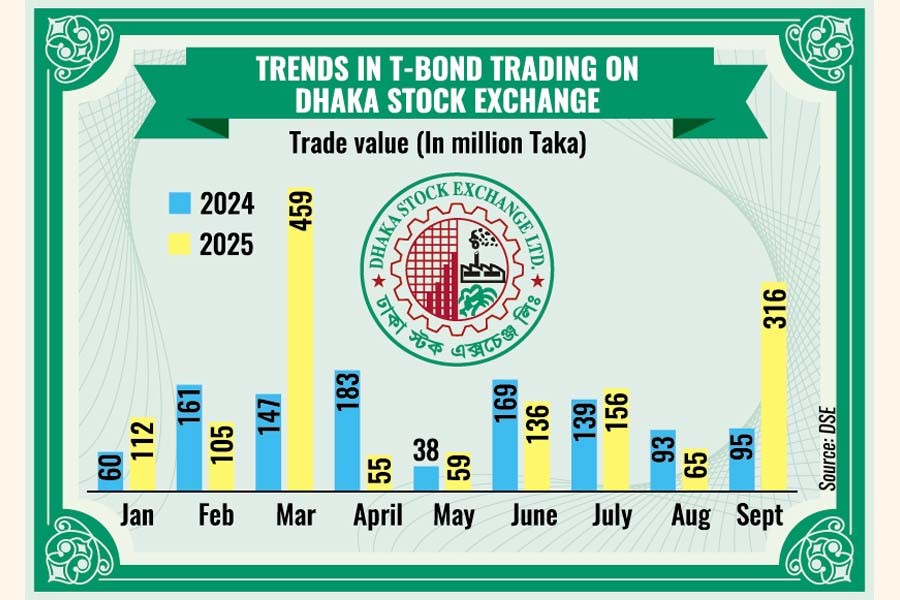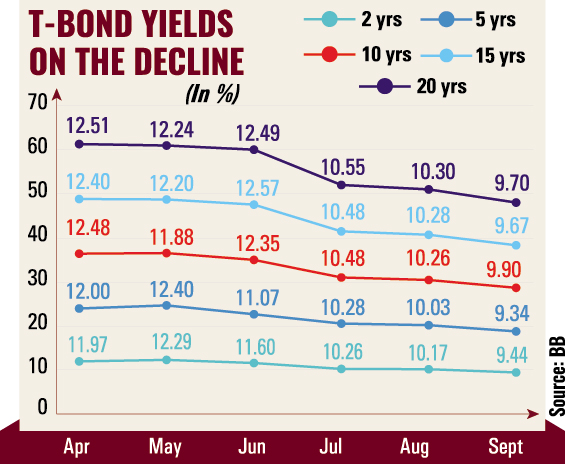Falling yields give fresh bout of energy to T-bond secondary market

Published :
Updated :

Trading in Treasury bonds in the secondary market has surged by 64 per cent year-on-year to Tk 537 million in the July-September quarter, against the backdrop of declining yields of the debt securities.

Bond prices are inversely related to interest rates, so sellers now see an opportunity to make capital gains.
Long-term bonds, which are particularly sensitive to price and interest rate movements, are becoming increasingly attractive to bond traders, said Akramul Alam, head of research at Royal Capital. “High duration bonds usually offer higher gain/loss opportunities. Such as a 5 per cent duration bond offers 5 per cent capital gain when there is 1 per cent drop in interest rate,” he added.
Bond duration refers to the sensitivity of bond prices to changes in interest rates.
In the past six months through September this year, the cut-off yields of bonds with maturities ranging from 5 to 20 years fell drastically by 253-281 basis points.
"As Treasury bond yields keep falling, traders are enjoying lofty capital gains, creating higher liquidity in the secondary bond market," said Mr. Alam.
However, experts say the trading value is still insignificant compared to the market's potential. Still, signs have already emerged that the Tk 2 trillion Treasury bond market is expanding and helping the secondary market grow as well.
"We have many beneficiary owner's (BO) accounts holding T-bonds - portfolios that were devoid of debt securities in the past. Investors now have better scope to exchange bond holdings, which is another reason for the higher trade volume," Mr. Alam added.
Treasury bonds are coupon-bearing long-term investment instruments with repayment periods ranging from 2 to 20 years. At present, there are 234 Treasury bonds listed on the prime bourse, half of which are trading above the face value of Tk 100 each.
Evolving market
Non-banking domestic sources for government borrowing include savings instruments introduced by the Directorate of National Savings (NSD) and T-bills and T-bonds issued through the central bank.
As returns from equity market investments remain unpredictable and low amid persistent economic uncertainties coupled with political tension, banks are channeling excess liquidity into government securities. Due to subdued private credit demand ahead of the national election, T-bonds are emerging as a good alternative for parking funds.
Salim Afzal Shawon, head of research at BRAC EPL Stock Brokerage, said institutional investors - including some fixed-income funds created in recent months - have been injecting money into T-bonds for safer and more diversified investments.
"Investors consider T-bonds a better alternative to bank deposits or savings certificates," said Mr. Shawon. "Many banks in the country are struggling with poor-quality assets, raising fears of default on interest payments. Moreover, T-bonds offer better liquidity and tax benefits too."
Trading in T-bonds began in the secondary market in October 2022, offering an additional investment tool for retail investors who had previously relied mainly on stocks and mutual funds.
Although investors initially faced difficulties trading via brokerage firms, in recent months many brokerages have equipped themselves to facilitate T-bond trading and have raised awareness among general investors about the instrument.
Despite favorable conditions for the secondary bond market to flourish, Mr. Shawon said, growth has been slower than expected. T-bond trading accounted for less than 1 per cent of daily turnover on the prime bourse.
He said the secondary market was capable of executing a much higher volume of trades than what was recorded, but high transaction costs remain a key barrier.
At present, the commission on selling T-bonds is 0.1 per cent, while there is no cost involved when banks trade bonds among themselves in the central bank's secondary market. A parallel secondary market for Treasury bonds exists at Bangladesh Bank and has been operational for years - another reason for the lower-than-expected trading volume in the capital market.
Major traders of Treasury bonds are banks, but they are reluctant to trade through the stock exchanges due to higher transaction costs.
Why T-bond yields are falling
Most banks prefer to invest their excess funds in risk-free government securities, given weaker private-sector credit demand, said a senior official of Bangladesh Bank.
Investment opportunities have shrunk in recent months because of the economic slowdown. Private sector credit growth slowed to 6.35 per cent year-on-year in August, down from 6.52 per cent a month earlier.
Increased liquidity in the money market has also contributed to the decline in T-bond yields. Moreover, the government has scaled back its borrowing through Treasury bills and bonds amid slow implementation of the Annual Development Programme (ADP) as part of austerity measures to curb inflation, reduce bank borrowing, and restore macroeconomic stability.
The government spent only Tk 57 billion, or 2.4 per cent of its ADP, in the first two months - July and August - of FY26.
The central bank's ongoing interventions through the purchase of US dollars from banks have recently injected additional liquidity into the banking system.
Since July 13, Bangladesh Bank has bought $2.09 billion directly from commercial banks under the current free-floating exchange rate arrangement, injecting around Tk 230 billion into the market, according to official data.
On one hand, banks are sitting on surplus liquidity, while on the other, the government still needs to borrow to bridge its budget deficit.
Mr. Alam of Royal Capital said the T-bond market would grow further as the government has to borrow billions of taka to reduce its budget deficit.
"Our tax collections are poor, so the government has no option other than T-bonds and T-bills to implement its budget," he added.
babulfexpress@gmail.com


 For all latest news, follow The Financial Express Google News channel.
For all latest news, follow The Financial Express Google News channel.